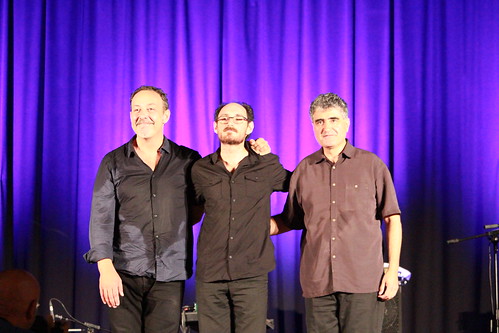The molecular basis of this adaptive response is not clear
ka complex promotes Aurora B activity to facilitate KT-MT turnover and prevent the accumulation of attachment errors. The Ska complex promotes Aurora B kinase activity at KTs independently of Aurora B centromere targeting Ska-depleted cells, but also with a decrease in Haspin kinasedependent phosphorylation of histone H3 on threonine 3, a chromatin mark important to target the CPC to the inner centromere. This finding prompted us to test whether chromosome scattering associated with cohesion fatigue or perturbed Haspin function may contribute to the decreased Aurora B activity levels in Skadepleted cells, but we found that neither induction of cohesion fatigue nor direct Haspin inhibition lowered Aurora  B activity toward histone H3-S10. To assess whether the impairment of Aurora B function in TSU68 web Ska-deficient cells was a result of perturbation of Aurora B kinase activity, we next monitored the levels of active Aurora B using phosphospecific antibodies against the Aurora B activation loop. To exclude effects caused by changes in bulk localization of Aurora B at centromeres, we focused our analysis on Ska-deficient cells with aligned chromosomes and costained the cells with Aurora B antibodies recognizing nonphosphorylated epitopes. We found that the extent of Aurora BT232 phosphorylation at KTs was significantly reduced, indicating that the Ska complex promotes Aurora B kinase activity at KTs. To further corroborate that the Ska complex regulates Aurora B activity independently of its centromere enrichment, we forced Aurora B accumulation at centromeres through expression of a CENP-B-DNA-binding domain -INCENP fusion protein. Although CBDBD-INCENP targeted to centromeres and drove Aurora B centromere enrichment in Ska-depleted cells as efficiently as in control cells, expression of CBDBD-INCENP failed to fully restore Aurora B activation loop phosphorylation. Likewise, ectopic targeting of Aurora B to centromeres did not rescue control levels of MCAK KT localization or H3-S10 phosphorylation. Collectively, these data suggest that the Ska complex enhances Aurora B kinase activity at both KTs and chromosome arms largely independently of its centromere localization. The Ska complex promotes Aurora B activity in an MT-dependent manner Next, we sought to determine the underlying molecular mechanism by which the Ska complex promotes Aurora B activity. Previous work suggested that concentration of the CPC at the inner centromere contributes to Aurora B kinase activity by transactivation. We therefore first examined the localization of CPC subunits in Ska-depleted cells, in which protein levels or complex formation of the CPC was not detectably affected. Although the localization of Aurora B and Borealin was less clearly defined at mitotic centromeres and appeared more diffusely distributed on chromatin in Ska-deficient cells with scattered chromosomes, cells with aligned chromosomes showed only a minor decrease in the centromeric enrichment of both proteins, arguing against the notion that abrogated CPC centromere recruitment is the primary cause for the observed defects in Aurora B substrate phosphorylation. Notably, we also found that CPC displacement from centromeres correlated not only with the alignment status of 80 JCB Volume 215 NumBer 1 2016 Most of the functions of the Ska complex have been linked to its ability to directly associate with spindle MTs. To see whether the Ska complex also requires its MT-binding capability PubMed ID:http://www.ncbi.nlm.nih.gov/pubmed/19836835 to promote Aurora
B activity toward histone H3-S10. To assess whether the impairment of Aurora B function in TSU68 web Ska-deficient cells was a result of perturbation of Aurora B kinase activity, we next monitored the levels of active Aurora B using phosphospecific antibodies against the Aurora B activation loop. To exclude effects caused by changes in bulk localization of Aurora B at centromeres, we focused our analysis on Ska-deficient cells with aligned chromosomes and costained the cells with Aurora B antibodies recognizing nonphosphorylated epitopes. We found that the extent of Aurora BT232 phosphorylation at KTs was significantly reduced, indicating that the Ska complex promotes Aurora B kinase activity at KTs. To further corroborate that the Ska complex regulates Aurora B activity independently of its centromere enrichment, we forced Aurora B accumulation at centromeres through expression of a CENP-B-DNA-binding domain -INCENP fusion protein. Although CBDBD-INCENP targeted to centromeres and drove Aurora B centromere enrichment in Ska-depleted cells as efficiently as in control cells, expression of CBDBD-INCENP failed to fully restore Aurora B activation loop phosphorylation. Likewise, ectopic targeting of Aurora B to centromeres did not rescue control levels of MCAK KT localization or H3-S10 phosphorylation. Collectively, these data suggest that the Ska complex enhances Aurora B kinase activity at both KTs and chromosome arms largely independently of its centromere localization. The Ska complex promotes Aurora B activity in an MT-dependent manner Next, we sought to determine the underlying molecular mechanism by which the Ska complex promotes Aurora B activity. Previous work suggested that concentration of the CPC at the inner centromere contributes to Aurora B kinase activity by transactivation. We therefore first examined the localization of CPC subunits in Ska-depleted cells, in which protein levels or complex formation of the CPC was not detectably affected. Although the localization of Aurora B and Borealin was less clearly defined at mitotic centromeres and appeared more diffusely distributed on chromatin in Ska-deficient cells with scattered chromosomes, cells with aligned chromosomes showed only a minor decrease in the centromeric enrichment of both proteins, arguing against the notion that abrogated CPC centromere recruitment is the primary cause for the observed defects in Aurora B substrate phosphorylation. Notably, we also found that CPC displacement from centromeres correlated not only with the alignment status of 80 JCB Volume 215 NumBer 1 2016 Most of the functions of the Ska complex have been linked to its ability to directly associate with spindle MTs. To see whether the Ska complex also requires its MT-binding capability PubMed ID:http://www.ncbi.nlm.nih.gov/pubmed/19836835 to promote Aurora